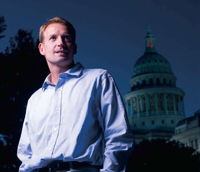Lone Star Lessons: Bringing the legislature to life
Sometimes political maneuvering can backfire once a majority party loses power.
For example, the Texas delegation of democrats and republicans worked well together through the mid-1990s. after republicans gained more congressional power, former house majority leader Tom delay worked to readjust the political districts in Texas to create more republican districts.
“This worked well when the republicans were in power,” Theriault explains. “The problem with the strategy is that once the Democrats took over, there were no senior members from Texas, so the state’s delegation has lost significant power.”
Theriault uses the Texas example to bring the lessons of politics home, which is important to the scholar who believes that the biggest effect of his nationally recognized research is on the students in his classroom.
In addition to leading students on a Spring Break exploration of Washington, D.C., Theriault is known for bringing politics to life in his popular courses in american government by encouraging student discussion and hosting watch-parties on debate and election nights.
Theriault has earned the eyes of Texas Teaching excellence award, the President’s Associates Teaching Excellence Award and this year’s Friar Centennial Teaching fellowship, the most prestigious undergraduate teaching prize at the University. Nicole Trinh, co-chair of the 2009 friar Centennial Teaching fellowship, says Theriault is an extraordinary faculty member who is considered a great friend and mentor to students across campus.
“He always goes above and beyond the call of duty, ensuring that his students not only learn concepts inside the classroom but that they experience them as well,” she says. “He provides the opportunity for students to see his teachings come to life.”
Psychological state of the Union
When it comes to personality, is there a geographic divide? After years of collecting personality data, sam gosling and Jason Rentfrow embarked on a psychological tour of the United States to find out.
Based on more than 600,000 surveys, the researchers found statewide differences in personality do exist and can be used to better understand regions, from predicting voting patterns to identifying creative communities. Rentfrow (Ph.D. Psychology, ‘04), an assistant professor at the University of Cambridge, also is mapping regional personalities to examine their relationships to such issues as health and work practices throughout the United States.
Diversity of Latino Voters
Jason Casellas, assistant professor of government, examines Latino politics, but he cautions against tossing around the term “Latino voter” because there is hardly one type of Latino who votes.
Casellas, who with David Leal co-directs the Public Policy Institute, explains that Mexican-Americans comprise 2/3 of U.S. Latinos. Puerto Ricans and Cuban-Americans are the next largest groups. But there also are Colombians, Dominicans, Nicaraguans, and the Washington D.C. community has many Salvadorans.
“To look at Latinos as a monolithic group does a disservice to the different nuances of the community,” he says.
Political Preparedness
Veronica Stidvent (B.A. Plan II and American Studies, ‘96) directs the Center for Politics and Governance at the LBJ School, where emerging leaders learn to be more effective by merging theoretical knowledge and practical applications.
The center focuses on the effect of campaign politics on policy, the changing demographics of the American electorate, ethical leadership, and the role of the media and emerging technologies.
Prior to joining the university, Stidvent served as the assistant secretary for policy at the U.S. Department of Labor and in the White House as special assistant to the president for policy under the George W. Bush administration.
On Scandal
From Bill Clinton’s nationally publicized indiscretions with Monica Lewinsky, to Richard Nixon’s infamous Watergate scandal, Ari Adut examines the sociology of scandal in “On Scandal: Moral Disturbances in Society, Politics and Art” (Cambridge University Press, 2008).
The assistant professor analyzes the vulnerabilities of presidents, the rise in sexual politics and reactions to controversial content in modern art. He reveals the conditions that cause scandals, while others slip under the radar.
